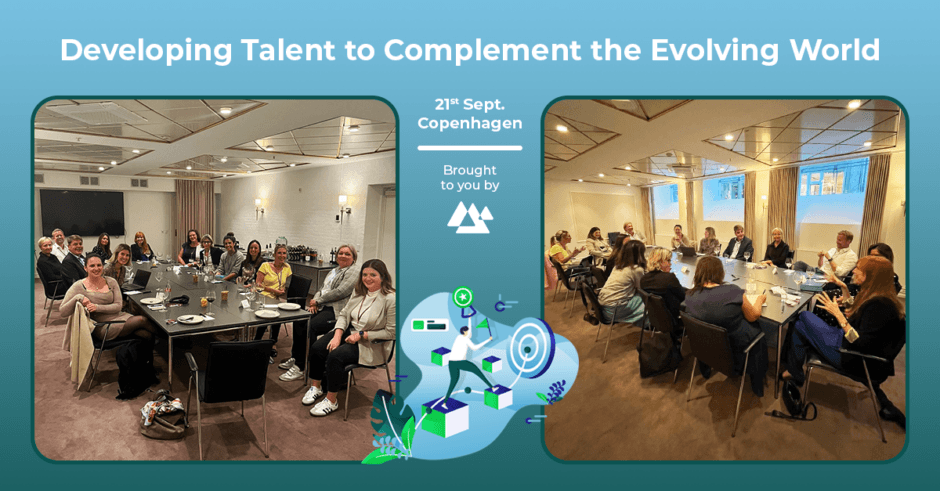Annapurna recently hosted an insightful roundtable, at the Phoenix Hotel in the heart of Copenhagen, where HR leaders shared thoughts around Developing Talent to Complement the Evolving World.
The discussion, which was attendee-led, was hosted by Becky Finnegan (Associate Director at Annapurna) and followed by a networking session and some drinks at the venue.
The conversation mainly delved into embracing AI in the business landscape, and brought about the following takeaways:
Cultivating Essential Values for AI Integration
In the rapidly evolving landscape of the business world, a clear divide is emerging between companies whose leaders are fully embracing AI and those who are imposing limitations on its integration. The choices made by these companies are already influencing their trajectories, with some opting for AI “ambassadors” or “evangelists”, while others impose restrictions on its application.
However, the key values that are driving the success of AI adoption within organisations go beyond pure technological integration. They encompass an open-minded approach, a willingness to explore uncharted territories, a sense of curiosity, and the acknowledgment that even the executive team may not have all the answers from the outset. Importantly, there is also a unique opportunity for knowledge to flow upwards from lower levels within the organisation. The executive leadership must actively listen to the insights and firsthand experiences of the business.
Nevertheless, the most important consideration is that teams must clearly define the problems they aim to solve with AI. The indiscriminate use of AI for its own sake can lead to inefficiency and a loss of strategic direction. Therefore, a well-structured approach is crucial.
Navigating the Evolving Landscape of AI Policies and Protocols
When it comes to policies and protocols governing AI, many organisations are still in the early stages of development, if they have even begun at all. The question of accountability appears large, although it’s widely accepted that an organisation’s size, structure, and direction are all contextually significant factors. Legal, technological, security, ethical, and code of conduct issues, all owned by the People Team, making them central to these discussions.
As employers, it is our responsibility to equip our teams with knowledge about AI. However, it’s equally vital for individuals to bring their unique skills and human perspectives to the table. Attendees recommended to read this McKinsey article here, which deals with Defining the skills citizens will need in the future world of work.
Are we assessing incoming employees for future-proof skills such as emotional intelligence, self-leadership, and digital learnings? AI alone cannot rectify human process issues, but it does present a substantial opportunity to upskill and support teams in adopting new ways of working, thereby enhancing productivity and fostering innovation.
In this era of data-driven decision-making, there is an outstanding agreement that the use and cleanliness of data is critical to most projects to ensure that investments are worthwhile, safe and secure. Different industries will experience varying degrees of impact, with sectors like HealthTech and Cybersecurity SaaS particularly vulnerable to scams, fake news, and AI-generated messaging.
Reassessing Roles and Skills
During these uncertain times, there is a clear shift towards contingent workforces. While hiring temporary staff can be invaluable for short projects, it also brings its set of challenges. The trend towards international remote workers presents opportunities but comes with its share of costs. As the People Team, building cultures and establishing strong communication avenues can be more challenging in hybrid setups.
Agile workforces, too, are evolving over time. Flexibility may not necessarily mean remote work every day; it could involve taking advantage of extended breaks to visit family while spending the majority of the year in the office. Companies that invest in their employees must strike a balance, recognising that what perks their teams desire can be a moving target. Empowering managers is crucial to getting things right as they are ultimately the best equipped to decide direction of the team.
Today, there is an opportunity to reassess an organisation’s direction and determine whether there is a need to repurpose roles based on skills, willingness, and capability.
In a world where success in the people function isn’t only measured by growth or recruitment, HR professionals must see themselves as integral to the commercial aspects of the business. They must challenge functional leaders to appreciate the value added and the ROI brought by HR initiatives. Educating managers on the entire employee experience, from recruitment to onboarding, embedding, growth, and progression, is critical to building a robust business case. A data-driven approach can further support these efforts.
As organisations continue to undergo major transformations driven by AI, qualities such as curiosity, transparency, open-mindedness, and cohesive teamwork will play a pivotal role in ensuring they remain competitive in the face of relentless change. Embracing AI is not just a technological shift; it’s a fundamental cultural and strategic evolution for modern businesses.
To attend similar events and engage in such conversations, browse our upcoming events in Europe here.

